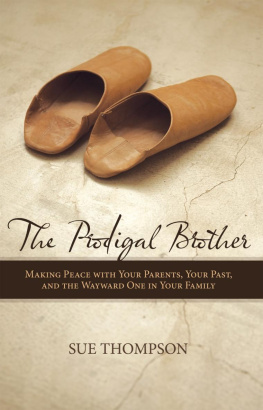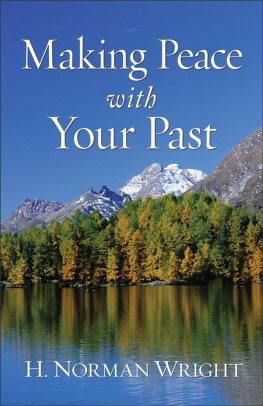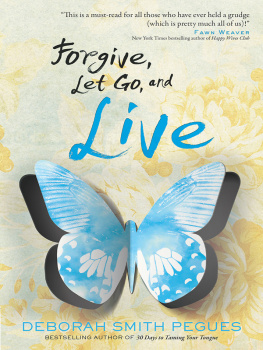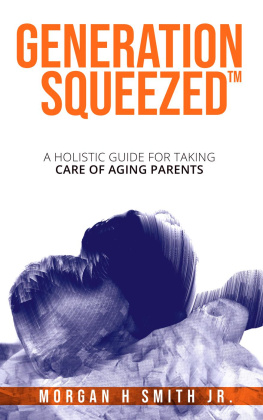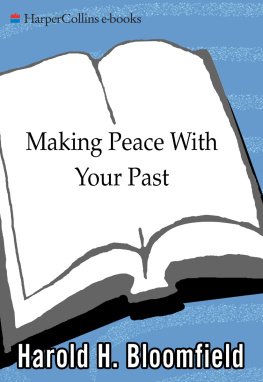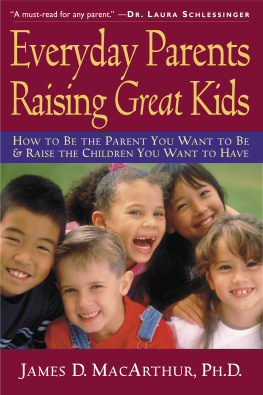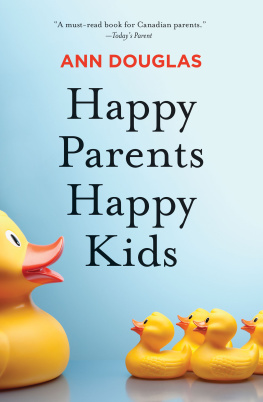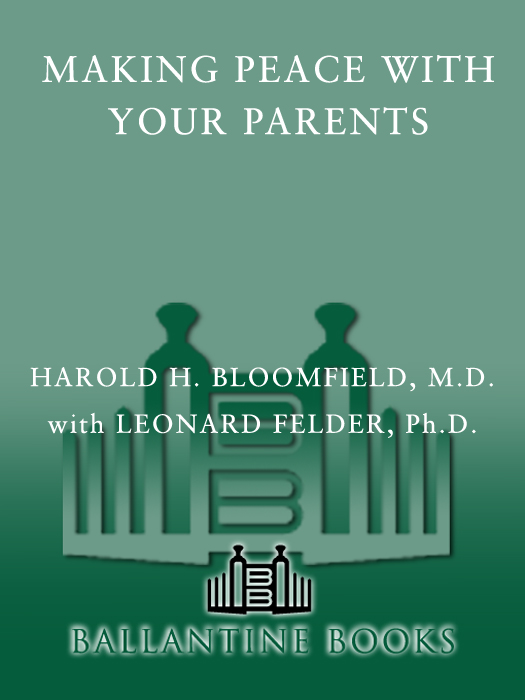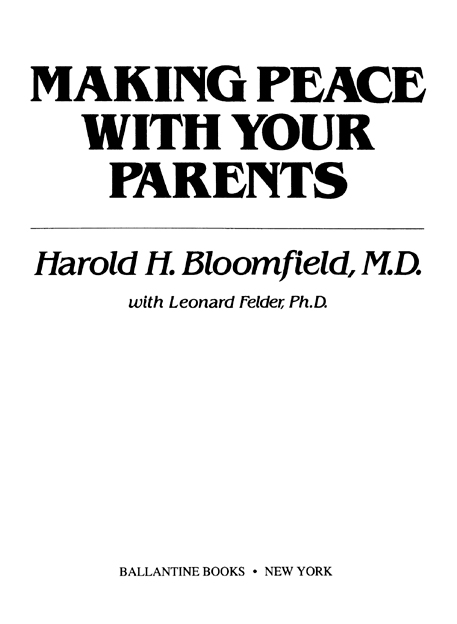Inquiries about the content of this book should be addressed to Harold H. Bloomfield, M.D., 1337 Camino Del Mar, Del Mar, California 92014.
A Ballantine Book
Published by The Random House Publishing Group
Copyright 1983 by Bloomfield Productions, Inc.
All rights reserved.
Published in the United States by Ballantine Books, an imprint of The Random House Publishing Group, a division of Random House, Inc., New York, and simultaneously in Canada by Random House of Canada, Limited, Toronto.
Grateful acknowledgment is made to Merriam-Webster, Inc., for permission to reprint an entry from Websters New Collegiate Dictionary, 1981 by Merriam-Webster, Inc., publisher of the Merriam-Webster Dictionaries.
Ballantine and colophon are registered trademarks of Random House, Inc.
www.ballantinebooks.com
Library of Congress Catalog Card Number: 96-96684
eISBN: 978-0-307-83226-9
This edition published by arrangement with Random House, Inc.
v3.1
Contents
Authors Note
To protect confidentiality, the names and identifying details in the case histories reported within the book have been changed. Any resemblance to persons living or dead is purely coincidental. Anyone with a history of psychiatric disorder, or who feels emotionally unstable, or who is taking major tranquilizers or antidepressant medication, should not do the exercises in this book without first consulting a qualified mental-health professional.
 A Personal Challenge
A Personal ChallengeIn the middle of a nationwide promotional tour for one of my books in the fall of 1978, I received a long-distance call from my mother. She was crying as she said, Youve got to come home. Your fathers in the hospital. Hes having emergency surgery for cancer.
I caught the next plane to New York. The thought that my father might die terrified me not only because of how much I loved him but because he and I had so much unfinished business to take care of. He had always been my father, but I felt that I barely knew him as a person. I was filled with guilt that on some level it was my fault he had developed cancer; that if I had not stayed away from my parents so much, maybe I could have done more for him.
Up until that phone call, I had thought that I had my relationship with my parents handled. Living more than three thousand miles away from them, I would join my mother and father for an occasional lunch or dinner when a lecture, book tour or business matter brought me back to New York. I would make sure to limit the reunions to an hour or two. By holding a tight lid on my conflicting feelings for my parents, I had always managed to avoid a direct confrontation during our strained conversations. While hardly enjoying the visits or our routine once-a-week phone calls, all of us nevertheless kept up the appearance of a caring family.
For most of my life, I had thought of my father as a victim and had felt sorry for the many frustrations he suffered. He often complained that his work didnt satisfy or adequately reward him. At home, most of the time my parents either argued or kept a hostile silence; the tension was such that I remember thinking as a child, God, just let me survive now and Ill heal later. While I loved my father, I also resented him for never breaking out of his rut. After struggling for his entire life, he had reached the age of sixty-five to face a hopeless decisionwork until he dropped dead or retire to spend twenty-four hours a day with my mother.
On the plane during the flight to New York to my fathers hospital bed, I sensed that you dont get to heaven aloneyou take your family with you. I realized that I had the opportunity to make this visit different from all the others. Even though I knew I could try to fake my way through it by bringing my father flowers while still holding all my feelings inside, I made up my mind that I was going to reestablish closeness with each of my parents. Keeping them at arms length was no longer what I wanted. After years of resenting my obligatory reunions with my parents and blaming them for how unenjoyable it all was, this time I would make myself responsible for what I got out of the visit. I had never before viewed my training in medical school, psychiatry and human-potential seminars as a vehicle for relating to my own parents, yet it was clear that God or nature was saying, O.K., Bloomfield, lets see how much youve really learned.
The Two-hundredth Hug
My fathers skin was jaundiced as he lay hooked up to monitors and intravenous tubes in the intensive care unit of the hospital. Normally a well-built man, he had lost more than thirty pounds.
My fathers illness had been diagnosed as cancer of the pancreas, one of the most malignant forms of the disease. The doctors were doing what they could but told us that he had only three to six months to live. Cancer of the pancreas does not lend itself to radiation therapy or chemotherapy, so they could offer little hope.
A few days later, when my father was sitting up in bed, I approached him and said, Dad, I really feel for whats happened to you. Its helped me to look at the ways Ive kept my distance and to feel how much I really love you. I leaned over and started to give him a hug, but his shoulders and arms tensed up.
Cmon, Dad, I really want to give you a hug.
For a moment he looked shocked. Showing affection was not our usual way of relating. I asked him to sit up some more so I could get my arms around him. Then I tried again. This time, however, he was even more tense. I could feel the resentment starting to build inside me, and I was almost ready to say something like I dont need this. If you want to leave me with the same coldness as always, go right ahead.
For years I had used every instance of my fathers resistance and rigidness to blame him, to resent him and to say to myself, See, he doesnt care. This time, however, I thought again and realized the hug was for my benefit as well as my fathers. I wanted to express how much I cared for him no matter how hard it was for him to let me in. My father had always been very Germanic and duty-oriented; in his childhood his parents must have taught him how to shut off his feelings in order to be a man.
Letting go of my long-held desire to blame him for our distance, I was actually looking forward to the challenge of giving him more love. I said, Cmon, Dad, put your arms around me.
I leaned up close to him at the edge of the bed with his arms around me. Now squeeze. Thats it. Now again, squeeze. Very good!
In a sense I was showing my father how to hug, and as he squeezed, something happened. For an instant, a feeling of I love you sneaked through. Where for years our greeting had been a cold and formal handshake that said Hi, how are you? now both he and I waited for that momentary closeness to happen again. Yet just at the moment when he would begin to enjoy the feelings of love, something would tighten in his upper torso and our hug would become awkward and strange. It took months before his rigidness gave way and he was able to let the emotions inside him pass through his arms to encircle me.
It was up to me to be the source of many, many hugs before my father initiated a hug on his own. I was not blaming him; after all, he was changing the habits of an entire lifetimeand that takes time. I knew we were succeeding because more and more we were relating out of care and affection. Around the two-hundredth hug, he spontaneously said out loud, for the first time I could ever recall, I love you.



